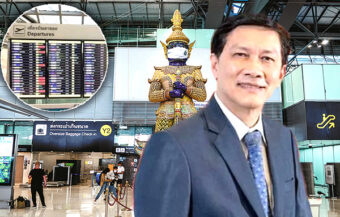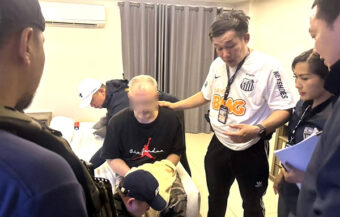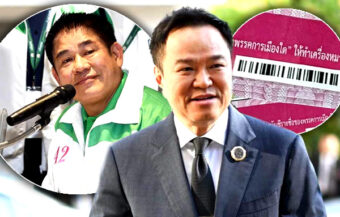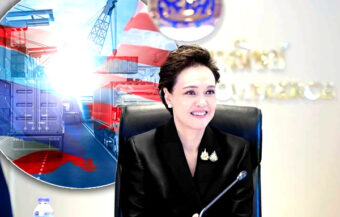Thammasat University legal scholar and former 1992 protest leader warns Thailand still faces the risk of another coup. Despite decades of progress, political deadlock and violence could trigger military intervention again if all sides don’t commit to the rule of law.
As Thailand’s political climate teeters on the brink of renewed crisis or deadlock, a leading academic has warned that the threat of another coup d’état still cannot be dismissed. On Saturday, Mr Prinya Thaewanarumitkul of Thammasat University — a former student leader during the 1992 protests that culminated in the Black May crackdown from 17 to 20 May — urged greater vigilance and stronger political commitment to prevent a repeat of past authoritarian interventions. Now a respected expert in constitutional law, Prinya calls for unified efforts to safeguard democratic governance and avoid another collapse of constitutional order.
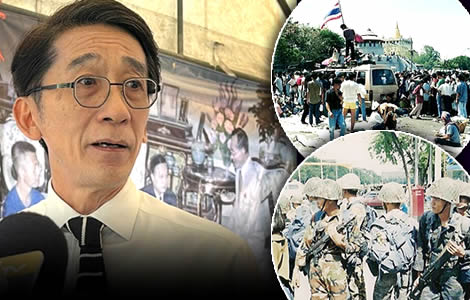
On the 33rd anniversary of the 1992 Black May uprising, Mr Prinya delivered a stark warning. He said Thailand still faces the threat of military coups and political violence, despite decades of supposed democratic progress. Presently, Prinya is a Vice-Rector for Administration and Sustainability at Thammasat University. In addition, he is a well-known legal scholar specialising in public law.
However, Mr Prinya was among the student protesters in May 1992 as Secretary-General of the Student Federation of Thailand. He later continued his studies in Germany before returning to take up teaching at Thammasat University in 1998.
Warning issued at memorial event as memories of 1992 crackdown stir fear of repeated military intervention
Speaking at Santiporn Park on Ratchadamnoen Road, Bangkok, Mr Prinya said plainly, “No one dares to say there will never be another coup.” He added, “I’m 68 now, and I’ve lived through too many of them to believe it’s over.”
The May Democracy Foundation, which he chairs, organised the event to commemorate the 1992 crackdown. The park itself, still under development, is intended as a permanent memorial and civic education space. It will mark the darkest days of modern Thai politics: 17 to 20 May 1992. That was when the military opened fire on protests to restore order.
That year, hundreds of thousands of protesters gathered at Sanam Luang and marched along Ratchadamnoen Road. They opposed General Suchinda Kraprayoon’s appointment as prime minister. Although he led the 1991 coup, he had promised not to take the post. But he broke that pledge, sparking widespread outrage.
Mr Prinya recalled the events vividly. “People filled the streets. They carried signs. They demanded a civilian government. Then the soldiers came.”
Security forces cracked down with force. Tanks rolled into the capital. Soldiers, overwhelmed, later fired live rounds into the crowd. They resorted to violence to quell the disturbance. “There was blood on the pavement,” said Mr Prinya. “People were beaten and dragged into trucks.”
Survivors recall the horror of May 1992 as bodies disappeared and democracy momentarily reclaimed
Officially, between 50 and 100 people died. Nearly 700 were injured. Hundreds more disappeared. Eyewitnesses reported bodies being taken away and dumped. The exact death toll remains unknown.
“These were ordinary people—students, workers, citizens,” Mr Prinya said. “They came peacefully and were met with gunfire.”
The violence shocked the nation. International pressure mounted. Eventually, King Bhumibol summoned General Suchinda and protest leader Chamlong Srimuang to the palace. Both appeared on live television, kneeling before the monarch. Within days, Suchinda resigned. Elections followed. Thailand briefly returned to civilian rule.
However, Mr Prinya stressed, the pattern didn’t end there. “We thought it was finished. But it wasn’t.” Thailand has since seen coups in 2006 and again in 2014.
He argued that the military no longer seizes power easily. But crucially, it still does. “They come out when the situation breaks down,” he said. “When politicians or protesters create deadlock.”
Prinya calls for all factions to resist inciting coups and to keep political battles within legal limits
Therefore, he urged all parties to resist such behaviour. “Don’t surround polling stations. Don’t invite the military in.” He warned that political instability is what gives the army its opening.
“Every time we fight outside the rules, we invite a coup,” he said. “We can’t pretend it’s not possible.”
He also called for clear commitments from all stakeholders. “Can military leaders promise never to stage a coup again?” he asked. “Can all political parties agree not to create excuses for intervention?”
Mr Prinya said Thai politics should operate like a sport. “Red, blue, orange, green—whatever the colour, everyone must follow the rules.” He likened rival parties to boxers. “They can fight in the ring, but not outside it.”
He added, “The election is the only real referee. The people decide. No one else.”
Current deadlock and blocked election outcome deepen tensions and increase likelihood of future instability
Today, Thailand remains politically fractured. The Move Forward Party won the most seats in 2023. Yet its leader, Pita Limjaroenrat, was blocked from taking power. Conservative senators and establishment forces opposed his rise. That decision angered many voters and deepened distrust.
Mr Prinya said this sort of manipulation creates dangerous pressure. “We have democratic tools,” he said. “But if we ignore them, the system breaks down.”
He warned that frustration can spiral. “When people feel ignored, they protest. When protests grow, the army waits.”
However, Mr Prinya still believes coups can be avoided. “It won’t happen if no one causes it,” he said. “We must not make them come out.”
He blamed all sides—government, opposition, and even the public. “Everyone has a role. No one is innocent if democracy fails.”
According to Mr Prinya, democracy does not mean the absence of conflict. “We can argue. We can disagree. But it must stay within the constitution.”
He stressed that losing an election does not justify destroying the system. “If your side loses, wait four years. Or less, if Parliament dissolves. That’s the rule.”
Memorial Park aims to preserve memory of 1992 crackdown and educate future generations on democracy
Santiporn Park, the future May Democracy Memorial, will help teach these lessons. It is expected to open in 2027. “By then, it will be 35 years since the bloodshed,” Mr Prinya said. “We should have learned by now.”
The park will include a museum, a research centre, and open spaces for dialogue. Its purpose is to educate the public—especially youth—about the cost of losing democracy.
“We want people to remember what happened,” Mr Prinya said. “But more importantly, why it happened.”
He criticised the country’s failure to properly acknowledge the May 1992 victims. “We call them democracy heroes. But where are their names? Their stories?”
Currently, many young Thais know little about the Black May events. Schools rarely teach it. Textbooks skim over it. “This is why we forget. This is why it repeats,” Mr Prinya said.
He noted that while such anniversaries often involve ceremony, the real goal is reflection.
“Don’t light candles if you don’t learn the lesson,” he said. “Don’t say ‘never again’ if you’re not willing to stop it.”
Prinya warns polarisation today mirrors past tensions that triggered coups and urges respect for legal process
When asked whether today’s polarisation could lead to another eruption, Mr Prinya didn’t hesitate. “Yes, if we’re not careful.”
He said the Red-Blue rivalry today is no different than past divisions. “They fight in Parliament. That’s fine. But don’t take it to the streets.”
He emphasised that democracy allows for strong opposition. “Whoever wins forms the government. The rest serve as watchdogs. That’s how it should work.”
He added that public anger is natural. But protests must remain peaceful. “If we don’t follow the process, we’ll go back to the tanks.”
Government in peril over the coming weeks with Constitutional Court petition over Senate collusion conspiracy
Justice Minister suspended from roles linked to the expanding Senate criminal investigation by the DSI
Shocking and real evidence of a massive Senate election collusion campaign. 1,200 people being probed by DSI
PM Paetongtarn confirms her father Thaksin will be in court on June 13th. Trade proposals sent to the US
Ultimately, Mr Prinya sees a hard truth. “We’ve made the same mistake too many times,” he said. “And we keep telling ourselves it won’t happen again.”
But it still could.
“There’s no written rule that says Thailand can’t have another coup,” he warned. “Only our actions can prevent it.”
And with that, he left a final message. “The people who died in May 1992 believed in something better,” he said. “We must not waste their sacrifice.”
Join the Thai News forum, follow Thai Examiner on Facebook here
Receive all our stories as they come out on Telegram here
Follow Thai Examiner here
Further reading:
Senate allegations growing in strength as powerful investigation gets underway. 7,000 people tracked



